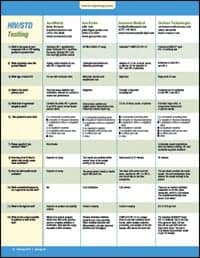A Florida-based university received a three-year, $1.3 million grant from the National Institutes of Health (NIH) for the development of an automated HIV self-testing assay.
Florida Atlantic University’s College of Engineering and Computer Science, in collaboration with FAU’s Schmidt College of Medicine, received the $1.3 million grant, and another $1.3 million will potentially be awarded after a programmatic review of the progress made in phase I.
With this assay grant, researchers are developing an affordable, disposable self-testing HIV-1 chip that can selectively detect HIV from whole blood samples, be highly sensitive to detect HIV during the acute infection, treatment and viral rebound; be rapid within 40 minutes; highly stable without requiring refrigeration; and fully automated providing true sample-in-answer-out ability.
“The greatest challenge to reducing HIV in developing countries that have limited resources is the absence of self-testing assays for viral load and the lack of trained technicians as well as modern laboratory infrastructure,” says Waseem Asghar, PhD, principal investigator and an associate professor in FAU’s Department of Electrical Engineering and Computer Science within the College of Engineering and Computer Science. “Currently, there is no reliable technology that can detect HIV during the early stages of the infection or measure viral rebound in antiretroviral therapy in treated patients in self-testing format.”
Asghar is developing this technology with co-investigator Massimo Caputi, PhD, a professor of biomedical science in FAU’s Schmidt College of Medicine, who has expertise in the molecular biology of HIV-1 and the mechanisms of regulating cellular and viral splicing. Caputi has made important contributions to the understanding of how cellular proteins modulate the replication of the HIV-1 genome.
The new technology employs an innovative microfluidic design integrated with molecular amplification that allows HIV testing without the need for skilled technicians to operate, making it suitable for self-testing format in developing countries as well as developed countries. The researchers plan to validate the functioning microchip with blood/plasma samples from more than 200 HIV-infected subjects.
“No molecular HIV self-testing technologies have yet been commercialized that are able to detect HIV during the early stages of acute infection or viral rebound in suppressed patients on antiretroviral therapy and there is an urgent need to develop reliable and affordable HIV self-testing technologies,” says Stella Batalama, PhD, dean, College of Engineering and Computer Science. “The technology that is being developed by professors Asghar and Caputi and our colleagues will be a game changer for helping to increase access to HIV testing and for improving treatment outcomes.”
Collaborators of the NIH grant include the University of Virginia and University of Pennsylvania.
Featured image: Waseem Asghar, PhD, principal investigator and an associate professor in FAU’s Department of Electrical Engineering and Computer Science within the College of Engineering and Computer Science Photo: Alex Dolce, Florida Atlantic University




